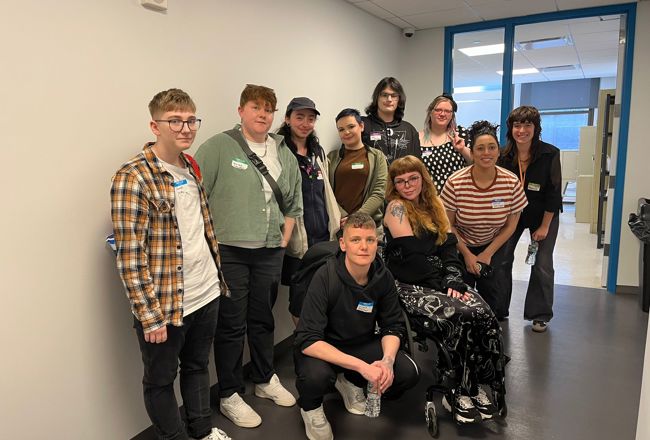- Share icon
- Share on LinkedIn
- Share on Twitter
- Share on Facebook

GISDA is a charity that provides accommodation, support and opportunities for homeless and/or vulnerable young people in Gwynedd to enable them to become independent. Read about their experience of receiving the Cynnig Cymraeg (Welsh Offer) below.
What Welsh services do you offer?
We offer advice and support to young people on various issues such as preventing homelessness, independent living skills, work experience and volunteering opportunities, mental health support and much more, all through the medium of Welsh.
Why is using Welsh important to you?
Using the Welsh language is very important to us. It means that we can offer support services in Welsh to young people, and that our staff can use Welsh. By promoting and facilitating the use of the Welsh language it normalises the language among young people, and encourages them to use the skills they have. We do not consider ourselves as an organisation that offers a Welsh language service in addition to our core services, the Welsh language has been an integral part of GISDA's work and identity since its establishment.
Describe the process of creating a Welsh Language Development Plan, from the decision to prepare a plan to receiving recognition from the Commissioner.
Before starting the process of preparing the Welsh Language Development Plan in 2021 we knew that there were already good practices in the company, but it gave us the opportunity to consider our services one by one and describe exactly what we were offering, and who was responsible for implementing this. Some changes were easy to implement and others took more time to plan, but all contributed towards raising the standard of our service.
Why is it important that you have received Cynnig Cymraeg?
As a charity based in Gwynedd, offering a service in Welsh is crucial in order to meet the needs of our service users and to reflect the communities we are part of.
What are the benefits of receiving the Cynnig Cymraeg?
Receiving the Cynnig Cymraeg gives an official recognition to the standard of our Welsh language provision and it is a way to show publicly that we are serious about the Welsh language in our organisation. Working with the Commissioner's office has enabled us to make valuable connections with other organisations in the third sector, some who have already received the Cynnig Cymraeg and others working towards it, in order to share good practice and learn from each other.
What are the benefits of offering a Welsh language service to your service users?
The benefits for users of our service are one of the main reasons for offering a bilingual service. To name just a few advantages, young people find it easier to talk about what's on their mind in their first language, it opens doors to a different culture, it's a huge advantage for their employability and it gives an opportunity for them to develop a unique skill.
Has the Cynnig Cymraeg made a difference to your work?
Working towards the Cynnig Cymraeg was an opportunity for us to consider what exactly our Welsh language services were. We were able to see what the gaps were in our Welsh language provision and how we can work to improve these things. This made a positive difference to our work because we had realistic targets to aim towards and clear steps to follow in order to achieve them.
Would you encourage others to work towards the Cynnig Cymraeg, and why?
Certainly. The process is easy and the Commissioner's officers support you through the application. Although some of the changes will require an investment of time or resources, the long-term effect these changes will have is definitely worth the effort.
Do you have any advice for any organisations that are considering working towards the Cynnig Cymraeg?
Our advice to any organisation that is considering working towards the Cynnig Cymraeg would be to ensure that all members of staff are aware that you are working towards receiving the Cynnig Cymraeg and what this will mean for the organisation and for the staff. This means that everyone is aware of what will change, and that everyone is working towards the same goal.
